|
|
|
Sort Order |
|
|
|
Items / Page
|
|
|
|
|
|
|
| Srl | Item |
| 1 |
ID:
180531
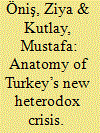

|
|
|
|
|
| Summary/Abstract |
A decade after the global financial turmoil, a new wave of crises is haunting the global South. This pattern is different from previous crisis episodes. Powerful shifts in the international order provide new policy space for emerging powers to manage their economic problems in a heterodox fashion. Key Western-led institutions no longer enjoy a monopoly in dictating the terms of financial assistance for countries in economic difficulty, as non-Western powers increasingly challenge the orthodox Washington Consensus paradigm. The present paper attempts to locate Turkey’s ongoing economic crisis in a comparative-historical context. Its central argument posits that the current crisis is the reflection of a fragile and unconsolidated presidential system and its associated mode of economic governance with state capitalist features. Turkey’s heterodox crisis allows us to draw attention to the complex interplay of global power transitions in a post-liberal international order and domestic political constellations during an era of growing authoritarian populism, generating a new equilibrium with rather unique features.
|
|
|
|
|
|
|
|
|
|
|
|
|
|
|
|
| 2 |
ID:
151999
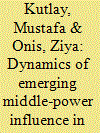

|
|
|
|
|
| Summary/Abstract |
This article attempts to understand the properties, potentials and limits of middle-power activism in a changing global order. Extensive debate on the rise of emerging powers notwithstanding, the potential contributions of emerging middle powers in regional and global governance, and the imminent challenges they face in their struggle for an upgraded status in the hierarchy of world politics, is an understudied issue. This study aims to fill this gap by offering a broad conceptual framework for middle-power activism and testing it with reference to the Turkish case. In this context, the authors aim to address the following questions: What kind of roles can emerging middle powers play in a post-hegemonic international system? What are the dynamics, properties and limitations of emerging middle-power activism in regional and global governance? Based on an extensive study of the Turkish case, the authors’ central thesis is that emerging middle powers can make important contributions to regional and global governance. Their ultimate impact, however, is not inevitable, but depends on a complementary set of conditions, which are outlined in this study.
|
|
|
|
|
|
|
|
|
|
|
|
|
|
|
|
| 3 |
ID:
176543
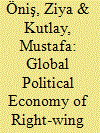

|
|
|
|
|
| Summary/Abstract |
The rise of right-wing populism should be studied as a truly global phenomenon. Domestic and regional contexts are obviously crucial, yet a narrow focus on the domestic realm fails to capture some of the key constituents and paradoxical features of the rise and resilience of right-wing populist projects around the world. Therefore, right-wing populism and the way its contradictions are ‘managed’ ought to be understood within the context of mutual interactions between: 1) an economy-identity nexus and 2) a domestic-foreign policy nexus. A critical review of six controversial aspects of right-wing populism in the global North and global South is used to substantiate this main argument.
|
|
|
|
|
|
|
|
|
|
|
|
|
|
|
|
| 4 |
ID:
158739
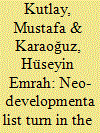

|
|
|
|
|
| Summary/Abstract |
The 2008 global economic crisis galvanized the debate on neo-developmentalism as the pendulum of economic thinking began to swing away from neoliberalism. The current shift in the modalities of market governance mainly deals with the ways through which industrial policies can be crafted in a more open-economy setting. Accordingly, the post-crisis literature turns a keen eye on the state’s developmental role in the research and development (R&D) sector in an age of ‘bit-driven’ global political economy. On that note, the nature, properties, and limits of state policies of emerging powers in this particular realm are becoming increasingly central but remain an understudied theme. This article discusses the R&D policies of Turkey from a state capacity perspective and questions the rationale of those policies by linking the state’s transformative capacity to the discussions on distributive pressures. Drawing on 21 in-depth semi-structured interviews, this article assesses Turkey’s R&D policies.
|
|
|
|
|
|
|
|
|
|
|
|
|
|
|
|
| 5 |
ID:
171319
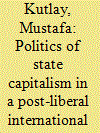

|
|
|
|
|
| Summary/Abstract |
This article discusses the transformation of the liberal international order, with reference to the ways in which global shifts affect the developmental paradigms among the emerging middle powers. Although it is rarely contested that the liberal order is being severely tested, the dynamics and potential consequences of this transformation are a matter of intense controversy. Also, the debate mainly focuses on great power politics, without paying adequate attention to the ways in which middle powers are influenced by and inform the transition to a post-liberal international order. By focusing on the case of Turkey, this article addresses whether non-Western great powers (Russia and China in particular) are leading the emergence of alternative order(s), and if so, through what mechanisms. Based on the reciprocal interactions between ideas, material capabilities and institutions, I argue that the preferences of the Turkish ruling elite seem to be gradually shifting from a Western-oriented liberal model towards a variety of ‘state capitalism’ as an alternative developmental paradigm in a post-liberal international order.
|
|
|
|
|
|
|
|
|
|
|
|
|
|
|
|
| 6 |
ID:
124211
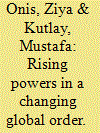

|
|
|
|
|
| Publication |
2013.
|
| Summary/Abstract |
The rise of bric s presents a major challenge to the existing global order. A second category of emerging powers, which may be labelled near- bric s, have also displayed increasing pro-activism in recent years in terms of influencing the regional balance of power politics, in addition to their growing presence in international organisations and global affairs. It is in this context that we aim to examine Turkey as a striking example of a 'near- bric ' power, a country that has adopted an increasingly assertive and independent style of foreign policy with aspirations to establish itself as a major regional actor. Using the Turkish experience as a reference point, this paper aims to understand the extent to which near- bric countries possess the economic capacity, sustainable growth performance and soft-power capabilities needed to establish themselves as significant regional and global actors. The recent Turkish experience clearly highlights both the potential and the limits of regional power activism on the part of emerging powers from the 'global South'.
|
|
|
|
|
|
|
|
|
|
|
|
|
|
|
|
| 7 |
ID:
179813
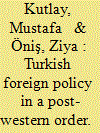

|
|
|
|
|
| Summary/Abstract |
Turkish foreign policy has dramatically transformed over the last two decades. In the first decade of the Justice and Development Party's (AKP) rule, the ‘logic of interdependence’ constituted the driving motive of Turkish foreign policy. In the second decade, however, the ‘logic of interdependence’ and the soft power-driven ‘mediator–integrator’ role were gradually replaced with a quest for ‘strategic autonomy’, accompanied by interventionism, unilateralism and coercive diplomacy. This article explores the causes of this dramatic shift. We argue that ‘strategic autonomy’, which goes beyond a moderate level of status-seeking compatible with Turkey's material power credentials, has a double connotation in the Turkish context. First, it constitutes a framework for the Turkish ruling elite to align with the non-western great powers and balance the US-led hierarchical order. Second, and more importantly, it serves as a legitimating foreign policy discourse for the government to mobilize its electoral base at home, fragment opposition and accrue popular support. We conclude that the search for autonomy from its western allies and the move towards the Russia–China axis has led to Turkey's isolation and permitted the emergence of new forms of dependence.
|
|
|
|
|
|
|
|
|
|
|
|
|
|
|
|
|
|
|
|
|